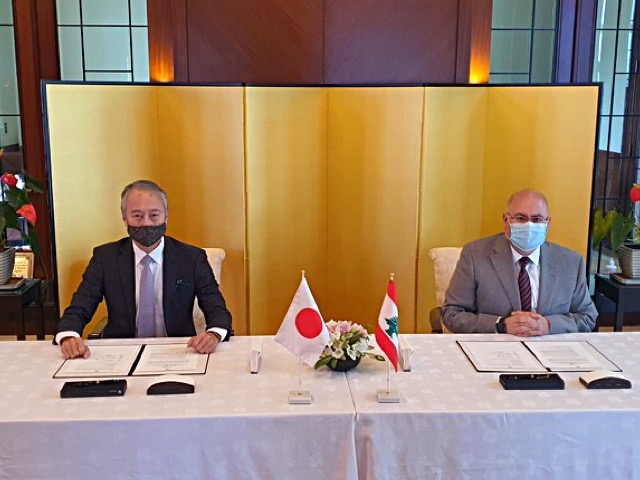
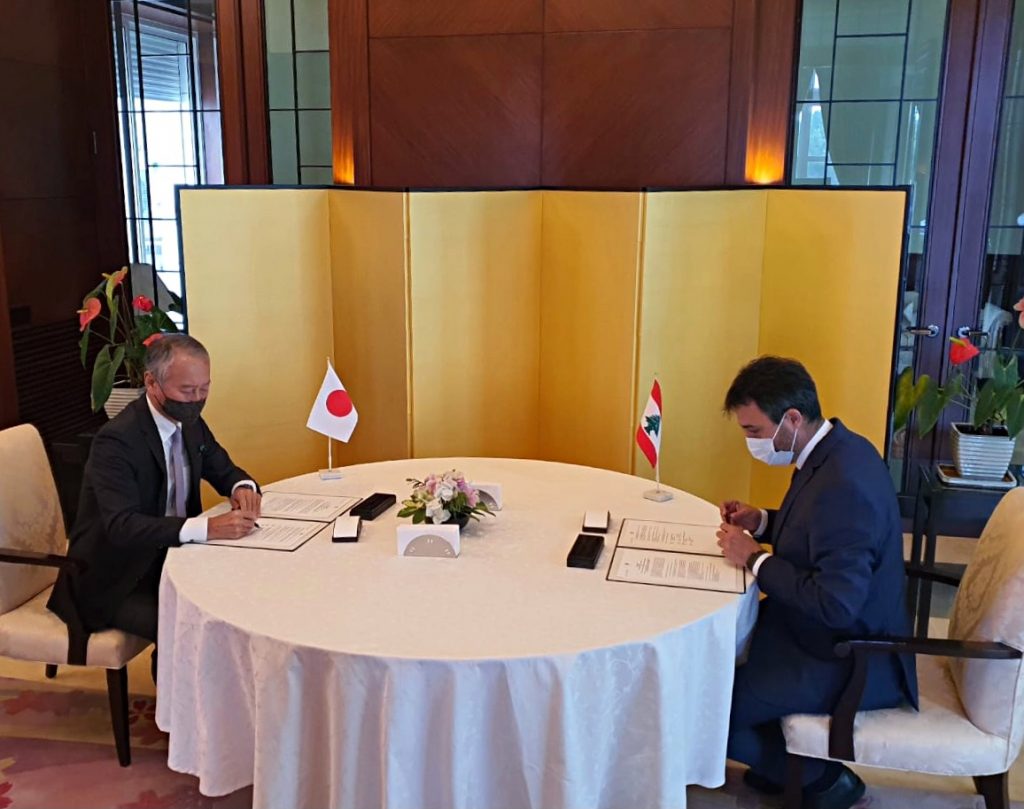
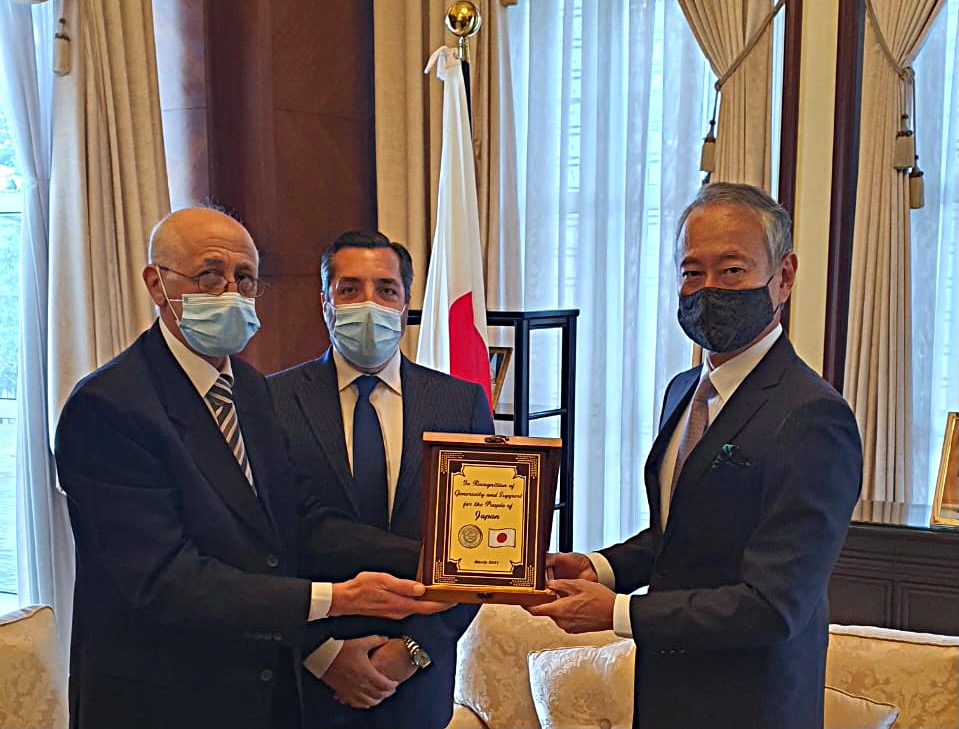



Carla Chahrour
The Japanese government pledged several grants to multiple health-care facilities in Lebanon on March 3 and 4 to affirm their commitment to improving the country’s health sector.
Lebanon has been assailed for almost a year by compounded crises specifically, an economic and financial crisis, followed by the coronavirus COVID-19 pandemic and the explosion at the Port of Beirut.
To help in the advancement of the health-sector and provide equitable health to patients in all communities throughout the country, Japan has provided assistance to the Rafik Hariri University Hospital, the Karagheusian Primary Healthcare Center and the Dar Al Ajaza Al Islamia Hospital, among other centers, all of which cater and take into account the unique circumstances of the different groups within vulnerable communities in Lebanon.
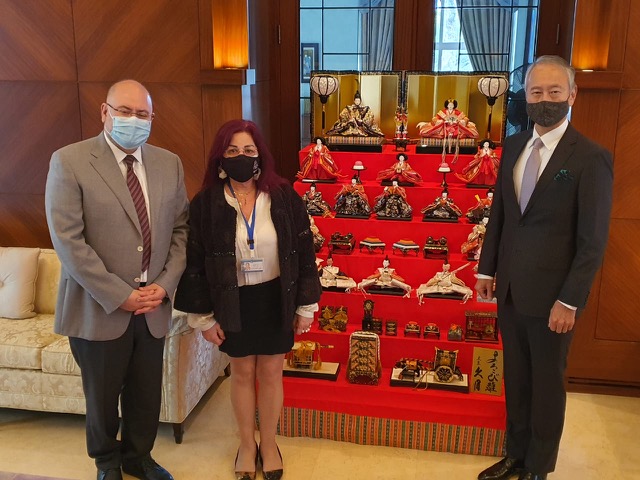
Japan pledged a $89,700 (¥9,624,422) grant to Rafik Hariri University Hospital in Beirut, to serve as funding for equipping critical care units with the infusion pumps and syringe pumps.
The Japanese Ambassador to Lebanon Takeshi Okubo signed a grant contract with Dr. Firas Abiad, Chairman of the Board and director general of Rafik Hariri University Hospital on March 3.
This aid aims to help reinforce the critical care units of the Rafik Hariri University Hospital, Lebanon’s biggest public hospital, the main government coronavirus facility and one of the vaccination centers that has served as a pillar of accessible, quality health care in Lebanon through acting as the interface between communities and the health system.
The Grant Assistance for Grassroots Human Security Program is expected to enable the hospital to provide more than 10,000 patients annually with more effective health care and reduce the burdens placed on critical care units that are under constant pressure from the coronavirus COVID-19 pandemic.
The virus has placed an additional burden on a public health system that was already on the brink because of the country’s currency crash and inflation, as well as the consequences of the massive Beirut port explosion last summer that killed almost 200 people, injured thousands, and devastated entire sectors of the city.
During the ceremony, Abiad expressed his appreciation towards Japan’s continuous support to improve Lebanon’s health-care services amidst the unprecedented crises that the country is facing.
Okubo commended the hospital for it’s strong commitment to combating the coronavirus pandemic and reiterated Japan’s determination to continue to support Lebanon’s health sector.
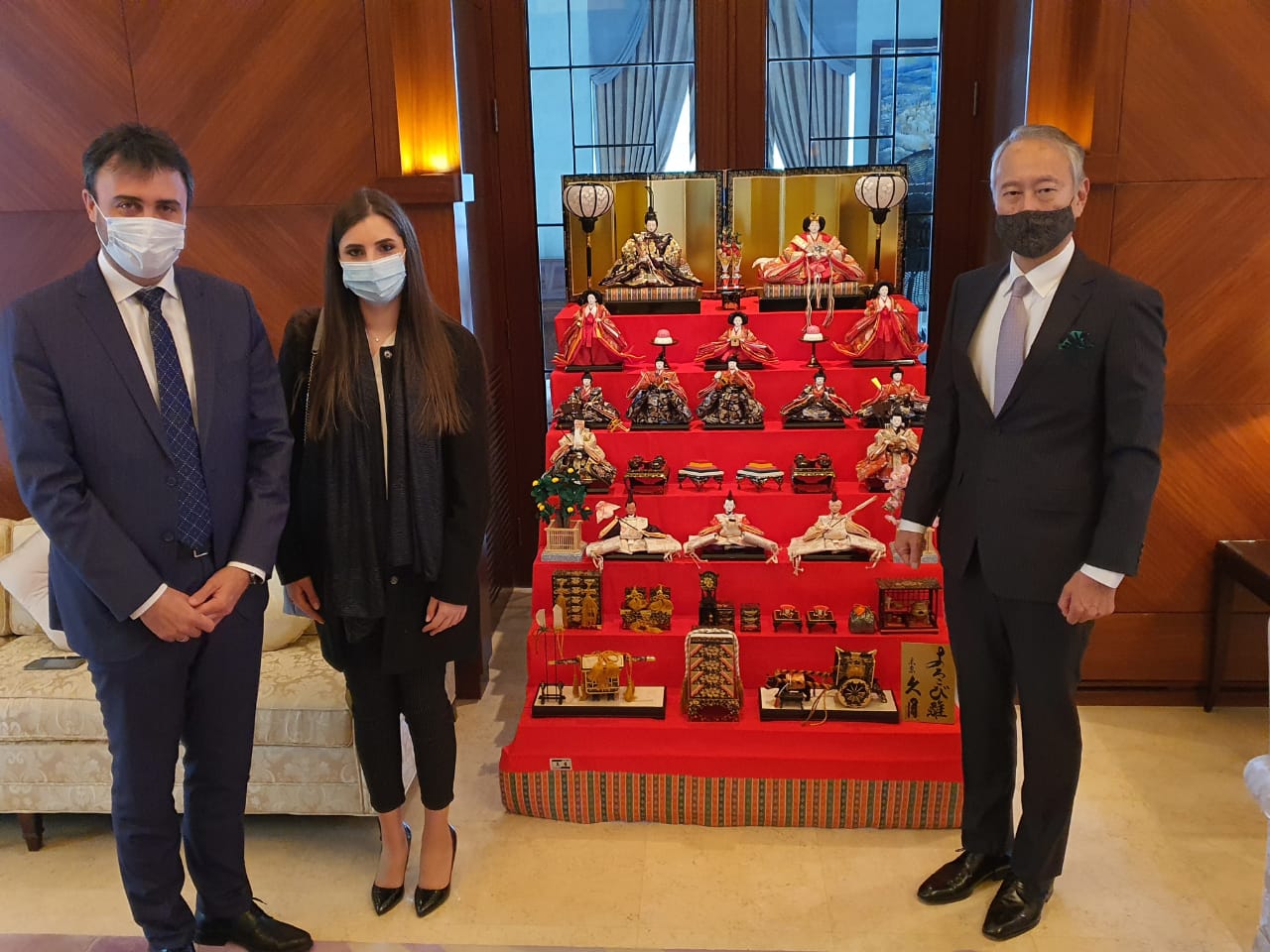
A second grant of $89,948 (¥9,654,184) was extended by the Japanese government to Karagheusian primary Healthcare Center in Beirut, to help improve the capacity of its diagnostic services through the provision of lab equipment, oral hygiene, dental care equipment and rehabilitation.
The Japanese Ambassador to Lebanon Takeshi Okubo signed a grant contract with Serop Ohanian, the Field Director of Lebanon’s Karagheusian Primary Healthcare Center on March 3.
The Karagheusian Primary Healthcare Center has been providing affordable healthcare services to Syrian refugees and their host communities in Beirut’s Bourj Hammoud, Matn district.
In recent years, the Center and its satellite clinic have suffered from a lack of necessary equipment for the medical laboratory and dental care unit. This has placed some communities at risk of losing access to health care services and the opportunities and resources they need to improve and maintain their health.
The grant, delivered through Grant Assistance for Grassroots Human Security Program, will help procure the medical equipment needed and enable more than 10,800 community members to gain access to more effective medical examinations and treatments. The ultimate goal of the grant is to provide vulnerable communities and the centers that serve them with the tools necessary to deliver essential health care services.
During the signing ceremony Ohanian expressed his appreciation towards the grant that would strengthen the healthcare center’s capacity to ensure that all individuals within vulnerable communities have access to equitable health services.
Okubo commended the Center for it’s generous support to vulnerable members of the population, including the Syrian refugees, despite the difficulties on the ground. He also reaffirmed his firm determination to benefit those most disadvantaged during such dire circumstances, taking into consideration that improvements in the standard of medical care in each community will contribute to the realization of social stability.
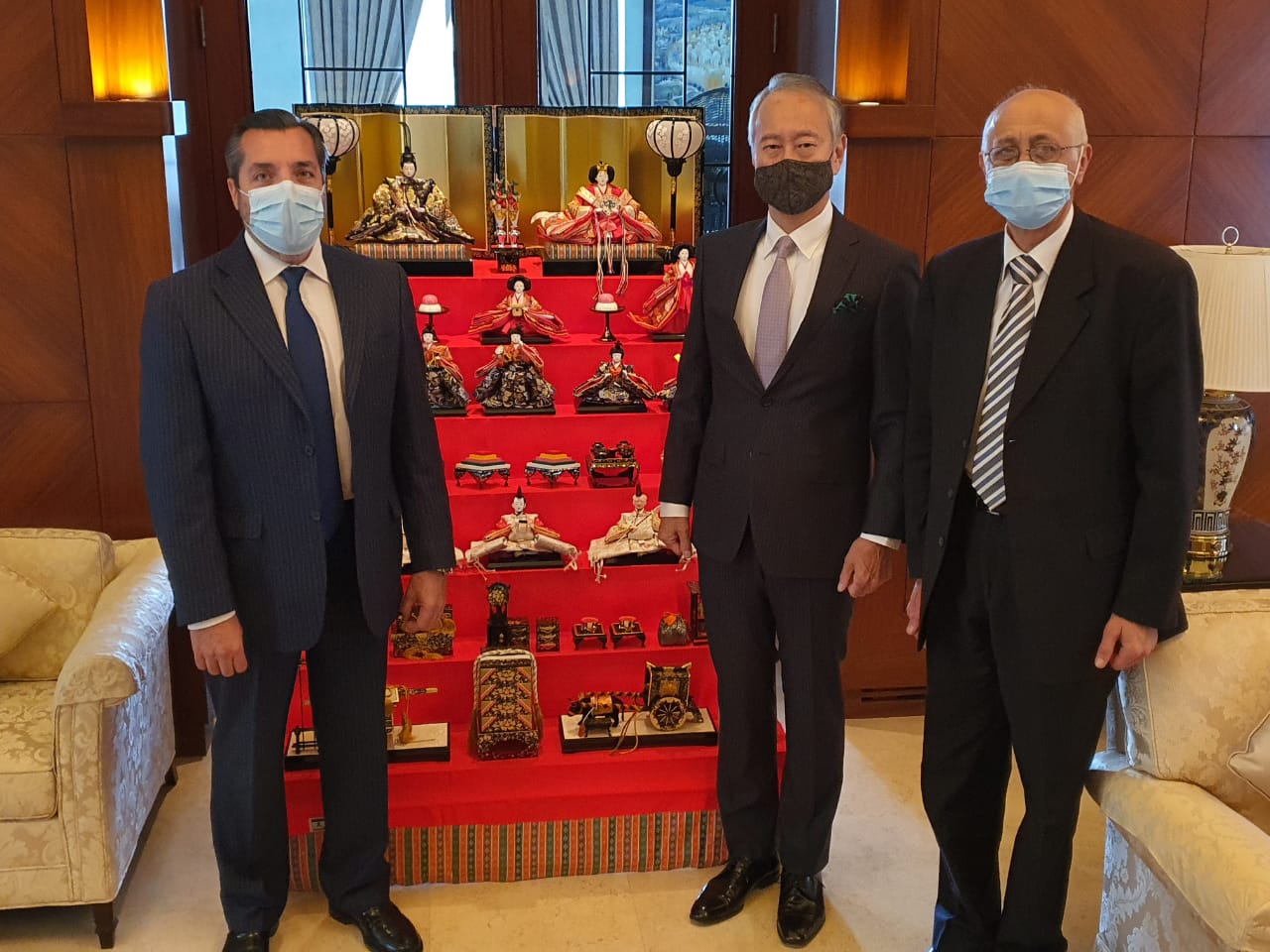
The third grant extended by Japan amounted to $58,341 (¥6,262,022) to Dar Al-Ajaza Al-Islamiyya Hospital (DAIH) in Beirut, Lebanon to help reinforce its healthcare data management system with a set of data computer server systems.
The Japanese Ambassador to Lebanon Takeshi Okubo signed a grant contract with Suheil Chmaitelly, Director General of Dar Al-Ajaza Al-Islamiyya Hospital on March 3.
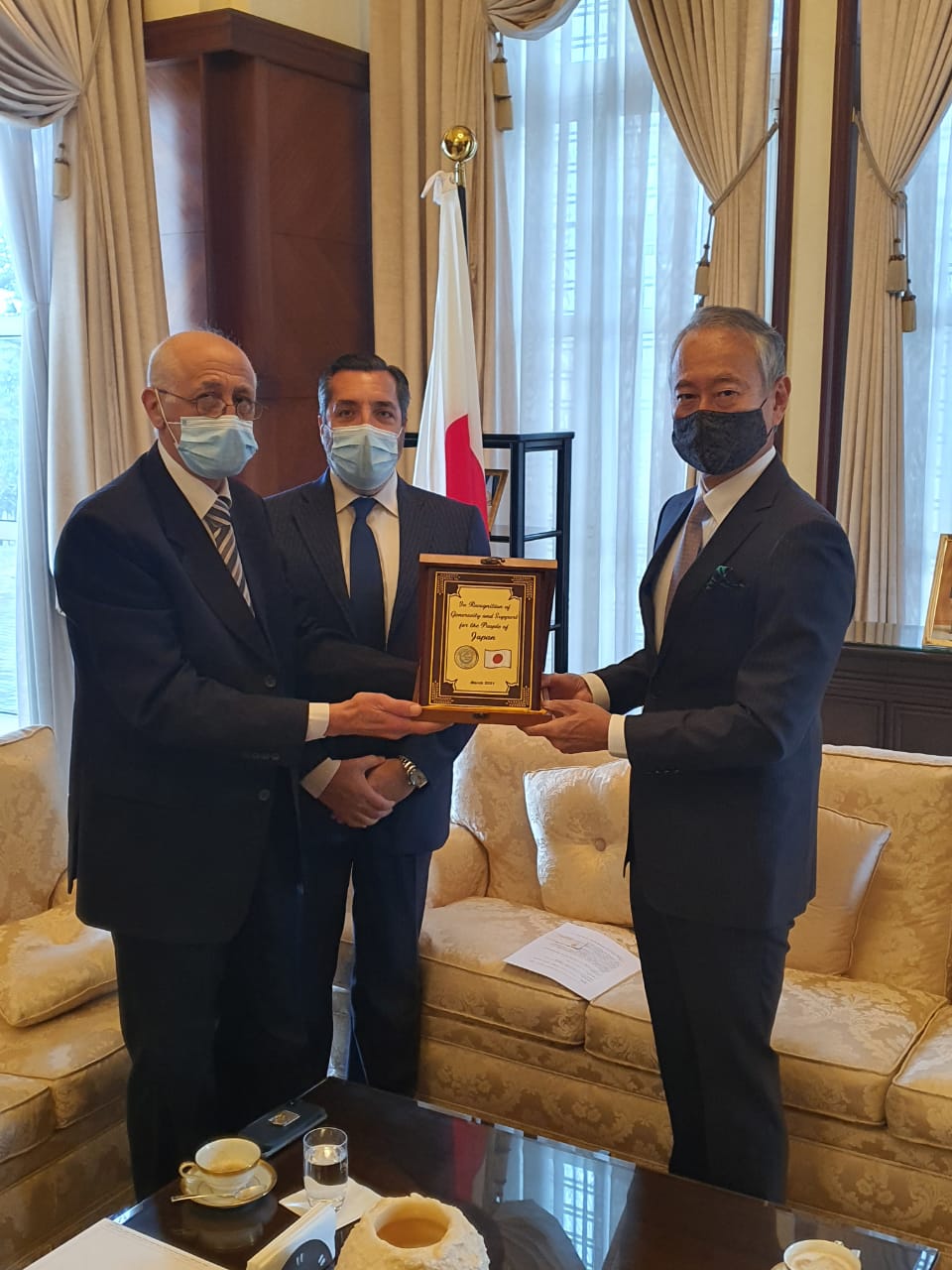
Dar Al Ajaza Al Islamia Hospital has played a primary role in the provision of health care services for people with special needs and elderly for more than 67 years.
The hospital’s mission throughout the years has been to improve the quality of life of all seniors and those who suffer from mental illness through offering individualized services based on the needs of each patient.
In consideration of their long standing contribution towards serving the community, Japan has decided to help the hospital purchase a set of data computer server systems that will improve the management of medical data. The project, delivered through Grant Assistance for Grass-roots Human Security Program is expected to substantially enhance the hospital’s performance by allowing it to more efficiently manage the medical records of more than 15,600 patients with more accuracy and precision.
At the signing ceremony, Souheil professed his appreciation of the close partnership between the two countries, which has allowed Japan and the hospital to unite under the common goal of improving healthcare services in Lebanon.
Okubo articulated his appreciation of the crucial role that the hospital has played in the extension of medical support to vulnerable members in the community and restated his determination to continuously support Lebanon’s health sector as one of the primary targets in Japan’s aid policy vis-à-vis Lebanon.
Japan will also be extending a $89,900 (¥9,730,281) grant to Ghobeiry Healthcare Center to help enhance its imaging and radiology services through procuring medical equipment, according to the Embassy of Japan in Lebanon.
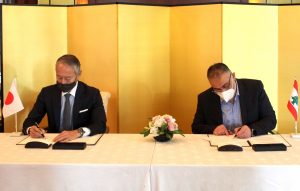
Ambassador Okubo signed a grant contract with Mr. Maan Khalil, Mayor of the municipality of Ghobeiry on March 4, who reiterated appreciation for Japan’s continued support.
Ambassador Okubo commended the municipality for its tireless effort in supporting the community members as well as Syrian refugees during these difficult times.
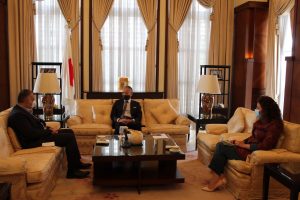
Ghobeiry Healthcare Center assists all community members equally with comprehensive and accessible medical care. Thus, the center plays an important role in securing healthcare for the vulnerable populations, Japan has decided to reinforce the Center by equipping its radiology department with advanced medical equipment.
With the Grant Assistance for Grass-roots Human Security Program, the Center becomes capable of providing more than 5,400 patients annually with efficient, low-cost, and quality health care services in a safe, and timely manner.
Another grant, worth $88,318 (¥2,602,096) will be given to Baakleen Medical Center for improving its diagnostic and screening services.
Baakleen Medical Center serves the communities in Chouf, Mount Lebanon as the only polyclinic in the district. Japan recognizes its contribution to providing necessary healthcare, and has offered medical equipment to facilitate the ophthalmology, ENT, cardiology, obstetrics, pediatrics, and surgery departments.
At the signing ceremony on March 4, Mr. Marwan Abou Ayyash, General Manager of Baakleen Medical Center, expressed his appreciation of the Japanese people’s generosity.
With this grant assistance, the center can expand its capacity to treat more than 10,000 patients with quality care annually.
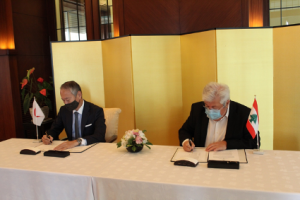
On the same day, Ambassador Okubo signed a contract with Ms. Caroline Duconseille, Country Manager of Handicap International Federation in Lebanon to provide a $416,270 (¥45 million) grant.
Japan has partnered with the organization’s demining arm over five years to expedite the clearance of explosives in Lebanon. Japan has decided to further provide demining equipment and cover expenditures for its operation in Batroun, Bcharre, and Koura, North Lebanon.
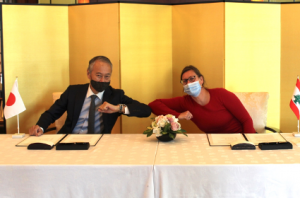
With this Grant assistance, Handicap International Federation will return access to safety to more than 9,410 beneficiaries.
Lebanon has been hit by one crisis after another, starting in October 2019, when the economy plunged into a financial crisis brought about by a sudden stop in capital inflows, which precipitated systemic failures across the banking and debt sector, as well as significantly effecting the exchange rate. During the same month, widespread protests against the country’s political class broke out. This has been compounded by the coronavirus COVID-19 pandemic and a massive blast in Beirut’s port last year.
The enumeration of crises ranging from the pandemic, to the social, economic and political unrest has driven nearly half the population of the small country of 6 million that is also home to over 1 million refugees from Syria, into poverty.
For millions of people living in vulnerable rural and urban communities, their hospital is an important, and often their only, source of health care. Japan’s continuous support of Lebanon throughout each crisis serves as a testament of the friendly bilateral relations between the two countries and acts as a glimmer of hope that the collaborative efforts implemented to promote a healthier community help in creating a foundation for the development of much-needed social stability.